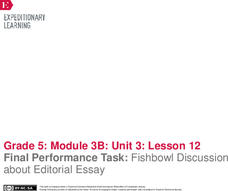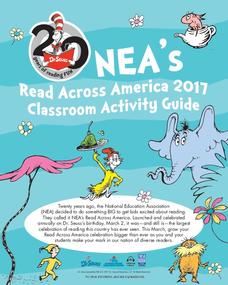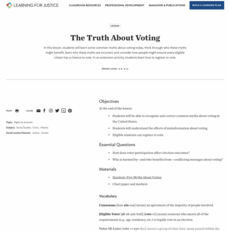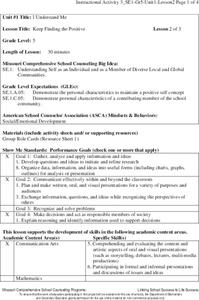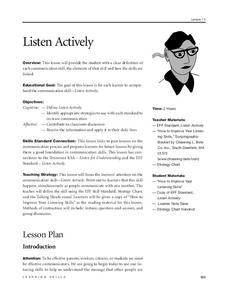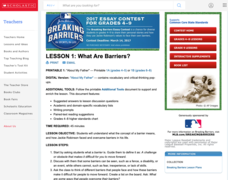EngageNY
Group Discussions and Revision: Editorial Essay
Great minds think aloud! Pupils participate in the Fishbowl protocol, discussing their opinions about the Mary River mine proposal. As they share their thoughts, peers provide feedback about their thesis and supporting ideas.
National Endowment for the Humanities
The House Un-American Activities Committee
Was the House Un-American Activities Committee justified in investigating subversive influences in the entertainment industry? Part two of the three-part series of lessons that examine the anti-communism movement after World War II,...
EngageNY
Final Performance Task: Fishbowl Discussion about Editorial Essay
Using the resource, learners share their essay revisions with a partner. Afterward, they participate in a Fishbowl discussion, receiving peer feedback about their editorial essays.
National Education Association
Read Across America Classroom Activity Guide
Celebrate the legendary Dr. Seuss on Read Across America Day with a plethora of activities set to five stories—The Cat in the Hat, The Lorax, Horton Hears a Who, Oh, the Places You'll Go!, and Green Eggs and Ham. Activities...
Digital Public Library of America
Ida B. Wells and Anti-Lynching Activism
A packet of 13 primary sources provides young historians with insight into the anti-lynching activism of civil rights Ida B. Wells. Included are images of Wells, her letters, a political cartoon, newspaper lynching announcements, and a...
Caucus 101
Linkage Institutions: Interest Groups: Option A
How are elections really run and won? Learn about special interest groups, super PACs, and lobbyists with an engaging lesson plan about the caucus process. Young voters research specific interest groups and analyze their part in previous...
Transforming Education
Social Awareness Strategies
What are the benefits of developing social awareness? Using the resource, readers learn strategies for fostering civil discourse, creating a participatory classroom, and enhancing family involvement. Scholars also take a personality...
Constitutional Rights Foundation
Conducting a Panel Discussion and Civil Conversation
The final lesson in an 11-session study of immigration asks class members to engage in either a panel discussion or a civil conversation of the controversial legal and policy issues they have investigated as part of the unit.
Simon & Schuster
Classroom Activities for The Count of Monte Cristo by Alexandre Dumas
Alexandre Dumas' The Count of Monte Cristo is the featured text in three classroom activities. The first activity asks readers to analyze the description of Edmond Dantes in Chapter XVII, paying particular attention to Dumas' word...
DocsTeach
Analyzing a Letter from Jackie Robinson: "Fair Play and Justice"
Jackie Robinson was more than a baseball legend; he was an activist, too. An interesting resource explores Robinson's time in the military using primary sources. Scholars examine the racially inspired event that led to a court martial...
Teaching Tolerance
The Truth About Voting
True or False: Only Presidential elections matter. Academics delve into common voting myths to understand what is true and why the election process is critical to democracy. The lesson uses group discussion, activities, and handouts to...
Anti-Defamation League
The Revealers: Discussion Guide for Grades 6-8
Suspense! Rebellion! Cyberbullying! No wonder Doug Wilhelm's novel The Revealers appeals to middle schoolers. Instructors new to using the novel and experienced veterans will find this discussion guide invaluable. Discussion...
Journey of a Substitute Teacher
Group and Partner Posters
Partners and Groups become acronyms on these posters that encourage kids to respect others, stay on task, participate actively, ask questions, and more when working with others.
EngageNY
Speaking and Listening Skills: Practice
After reviewing their resources from the unit, scholars participate in multiple group discussions with a World Café activity. During the discussions, they share ideas about their focus questions pertaining to Canada's natural resources...
Missouri Department of Elementary
Keep Finding the Positive
Group members take on roles to create a positive classroom community. Learners perform their role—leader, recorder, presenter, timekeeper, encourager, and collector—in preparation for a formal presentation of their positive thinking...
DocsTeach
The School Lunch Program and the Federal Government
The school lunch program is rooted in the struggles of the Great Depression and is still assisting families today. Academics research documents and images relating to the creation of the school lunch program. Scholars use a worksheet to...
DocsTeach
Where Was the New Deal?
Young historians delve into the origin of federal social programs to understand the impact of the New Deal. An informative activity explores some of the New Deal programs, such as the Civilian Conservation Corp, using historical...
DocsTeach
Court Packing vs. Reorganizing: The Supreme Court in the New Deal
Travel back in time to understand the effects of FDR's New Deal on the Supreme Court. Academics analyze historical documents to understand FDR's attempts to pack the Supreme Court and the opposition he faced. The activity includes a...
Seussville
Hooray For Diffendoofer Day!
Eleven engaging activities make up a story guide that accompanies Dr. Seuss' Hooray For Diffendoofer Day! Scholars design a fictional classroom setting including scary face tests, writing job descriptions, adapting the book...
DocsTeach
Alfred Sinker and the Writ of Habeas Corpus in 1861
Scholars learn how the judicial system treated under-age Civil War soldiers using historical analysis. The resource uses court documents to help historians understand why Habeas Corpus was used in the case of Alfred Sinker and why he was...
DocsTeach
Around the World with First Lady Pat Nixon
Travel the world with the First Lady! Academics study images from Pat Nixon's travels as First Lady to discover her role in Richard Nixon's presidency. Historians match images to world locations, complete a worksheet, and...
University of Tennessee
Listen Actively
Listening is a skill, and with the help of the communication activities in this packet, class members improve their active listening skills.
Museum of Tolerance
Improving My Community Through Social Action
Action is the heart of change. Encourage class members to not only identify critical social justice issues in their school or community but to take action as well. As individuals or as groups, they research a situation, develop a...
Scholastic
Lesson 1: What Are Barriers?
Scholars discuss the concept of a barrier with a short passage on Jackie Robinson. The writing process begins with a paragraph and several other sentences about Robinson's unique traits that made breaking a barrier...


